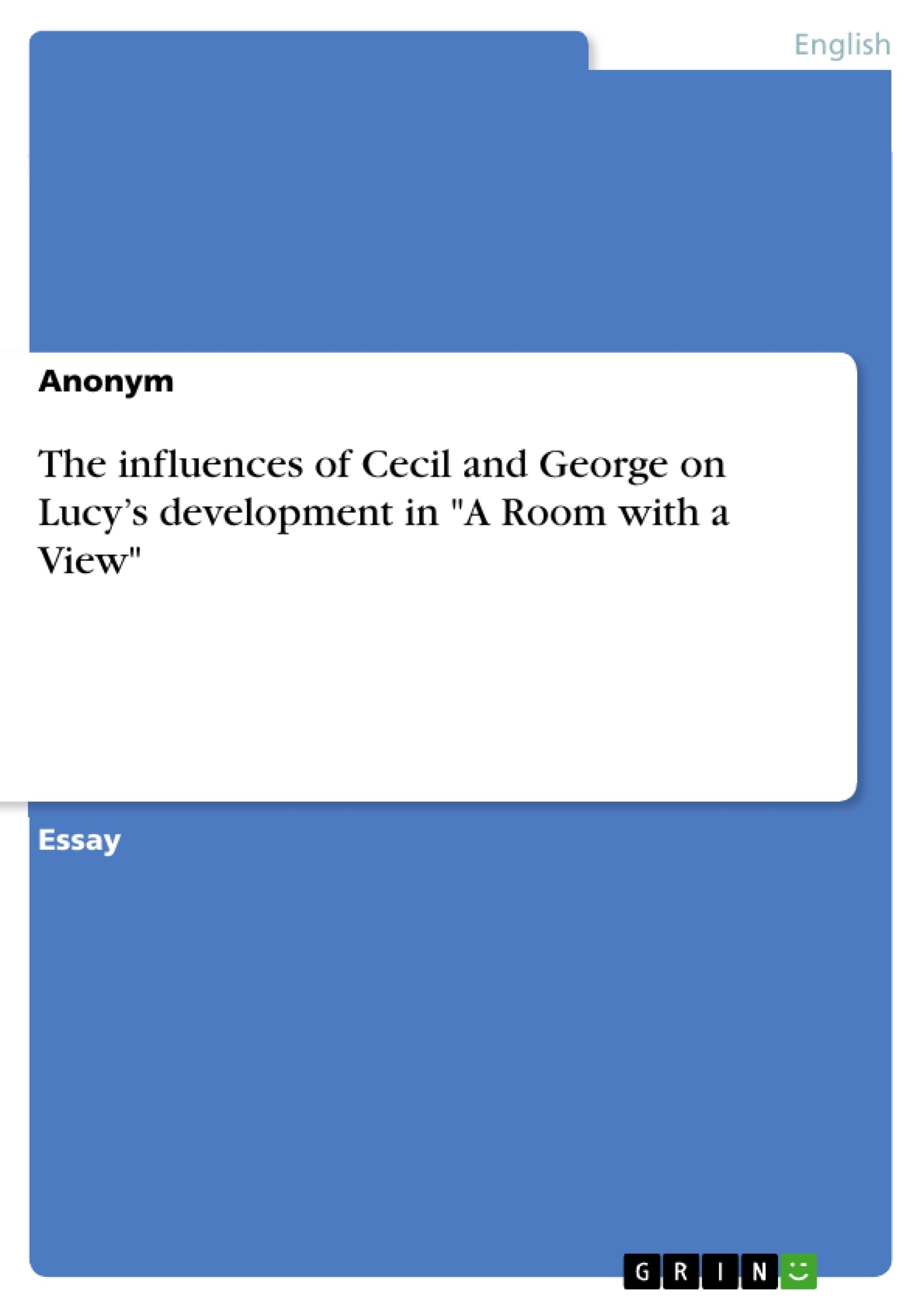“Remembering that she was engaged to Cecil, she compelled herself to confused remembrances of George: he was nothing to her; he never had been anything; he had behaved abominably; she had never encouraged him” (A Room with a View). This quotation from E. M. Forster’s novel A Room with a View, published in 1908, shows the protagonist’s, Lucy Honeychurch, confused feelings towards her two suitors. While Cecil is a promoter of the ancient image of womanhood and is regarded as her perfect suitor, George holds a more modern view. In the beginning, Lucy’s conservative upbringing can be accounted for her very conventional view and ambiguous feelings towards the unconventional George. She is mainly shaped through her family and their values and in George, she encounters a passionate and rather individual man for the first time in her life. Both men, Cecil and George, influence Lucy’s development equally and can be considered crucial determinants in her transition from a conventional girl to a freethinking woman.
Inhaltsverzeichnis (Table of Contents)
- The influences of Cecil and George on Lucy's development in A Room with a View
- Cecil's Influence on Lucy's Development
- George's Influence on Lucy's Development
Zielsetzung und Themenschwerpunkte (Objectives and Key Themes)
This essay examines the influences of Cecil and George on Lucy's development in E. M. Forster's novel, "A Room with a View." The essay analyzes the impact of both characters on Lucy's journey from a conventional young woman to a freethinking individual.
- The portrayal of traditional gender roles and expectations in early 20th-century England
- The contrast between conventional and unconventional views on love and marriage
- The importance of personal growth and self-discovery
- The role of social conventions and their impact on individual freedom
- The exploration of themes of love, passion, and social liberation
Zusammenfassung der Kapitel (Chapter Summaries)
The essay begins by introducing the protagonist, Lucy Honeychurch, and her conflicting feelings towards her two suitors, Cecil and George. Cecil, a representative of traditional societal values, embodies the expectations placed upon women in early 20th-century England. While initially perceived as a negative influence, the essay argues that Lucy's experiences with Cecil play a significant role in her development.
The analysis then shifts to George, whose unconventional views and passionate nature contrast sharply with Cecil's. George becomes the catalyst for Lucy's self-awareness and ultimately her liberation from societal constraints. Through their relationship, Lucy embraces a more modern and independent outlook on life and love.
Schlüsselwörter (Keywords)
Key terms and concepts explored in this essay include: gender roles, social conventions, personal growth, self-discovery, love, passion, liberation, traditional values, unconventional views, and equality of sexes.
Frequently Asked Questions
How do Cecil and George represent different views of womanhood?
Cecil promotes a traditional, conservative image of womanhood, while George embodies a more modern, passionate, and individualistic perspective.
What is the significance of the quote about Lucy's "confused remembrances"?
It illustrates Lucy Honeychurch's internal conflict between her conventional upbringing (represented by her engagement to Cecil) and her emerging feelings for the unconventional George.
What is the central theme of Lucy's development?
Her transition from a conventional, socially-constrained girl to a freethinking woman who embraces her own desires and self-discovery.
How did Lucy's family values shape her initially?
Her conservative upbringing accounted for her conventional views and her initial resistance to George's unconventional behavior.
What role does social convention play in the novel?
Social conventions act as obstacles to individual freedom and passion, which Lucy must eventually overcome to achieve personal growth.
- Citar trabajo
- Anonym (Autor), 2010, The influences of Cecil and George on Lucy’s development in "A Room with a View", Múnich, GRIN Verlag, https://www.grin.com/document/1360402



